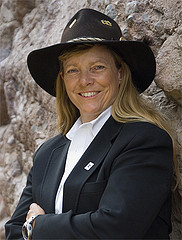 The Bard CEP National Climate Seminar Fall 2011 series hosted a conversation with Hunter Lovins, President and founder of Natural Capitalism Solutions, entitled “Climate Capitalism.” In Lovins’ view, “the business case is the strongest weapon for saving life on this planet.” If we drive sustainability in our businesses and communities we will make our communities prosperous and resilient. We have the tools, responsibility and knowledge to build a sustainable society, “the question is whether we will.”
The Bard CEP National Climate Seminar Fall 2011 series hosted a conversation with Hunter Lovins, President and founder of Natural Capitalism Solutions, entitled “Climate Capitalism.” In Lovins’ view, “the business case is the strongest weapon for saving life on this planet.” If we drive sustainability in our businesses and communities we will make our communities prosperous and resilient. We have the tools, responsibility and knowledge to build a sustainable society, “the question is whether we will.”
Many smart companies are now addressing environmental problems to make a profit, independent of whether a company thinks climate change is a hoax or not. Since an average sized corporation reports $30-40 million dollars annually in uncaptured energy savings, companies can realize energy savings through retrofitting buildings and the added benefit of a more efficient labor force. A study by the Rocky Mountain Institute showed that in efficient buildings, labor productivity rises by 6-16% due to quieter and more comfortable offices with better air and lighting. As a result, businesses are implementing sustainable practices to drive profitability.
According to Hunter Lovins, “The most important thing for the future of energy is efficiency.” Two main policy tools that Lovins laid out to achieve efficiency are PACE (property assessed clean energy) financing and CLEAN contracts. Both of these policy tools provide the up-front capital and incentives to invest in renewable energy projects and to bring more renewable electricity into the market place. The resilience of local communities can be increased with the installation of solar panels on roofs, locally produced small-scale wind power, and biofuel production for community use. Jobs will be created through incentivizing policies that accelerate the adoption of cost-effective clean energy across the United States. The non-profit organization Clean Coalition works to incentivize efficient and inexpensive energy to make it accessible to communities across the US. Individual cities and communities can take the initiative to implement sustainable energy saving practices. For this purpose, Natural Capital Solutions developed a Climate Protection Manual for Cities to lay out a path for implementing good practices and improving cities’ resiliency to climate change.The next National Climate Seminar is scheduled for October 19th with Sharon Nunes, Vice President of Smarter Cities Strategy & Solutions for IBM, for a discussion focusing on “Smarter Planet? IBM’s Climate Solutions.” For more information on the National Climate Seminar please see the NCS website. Podcasts of the conversation with Hunter Lovins and of previous NCS conversations are available here.

Know any undergraduates or recent graduates who aspire to be sustainability leaders in politics and business? Encourage them to apply to the C2C Fellows program.
Hunter’s partnership with the Unreasonable Institute aims to provide young innovators with the tools to entrepreneur our way out of this crisis. Every year the Unreasonable Institute brings 25 young entrepreneurs from around the world to Boulder, Colorado for an intensive summer mentorship program. With advice from mentors, these young entrepreneurs tackle environmental problems through innovative solutions with the aim of jump-starting successful businesses. Taking from this model, Lovins suggests a similar capitalism solution for US communities to solve the climate crisis, creating jobs and prosperity. Lovins left listeners with the message that there are infinite opportunities to innovate and solve the climate crisis starting at a local level.
The next National Climate Seminar is scheduled for October 19th with Sharon Nunes, Vice President of Smarter Cities Strategy & Solutions for IBM, for a discussion focusing on “Smarter Planet? IBM’s Climate Solutions.” For more information on the National Climate Seminar please see the NCS website. Podcasts of the conversation with Hunter Lovins and of previous NCS conversations are available here.
Know any undergraduates or recent graduates who aspire to be sustainability leaders in politics and business? Encourage them to apply to the C2C Fellows program.